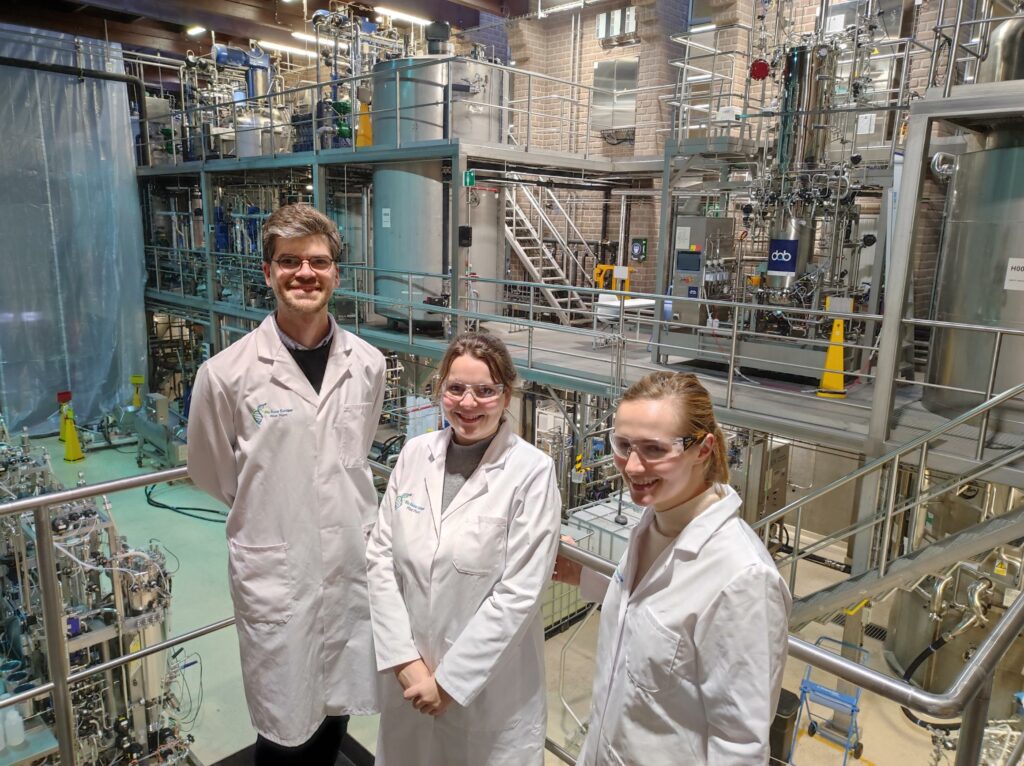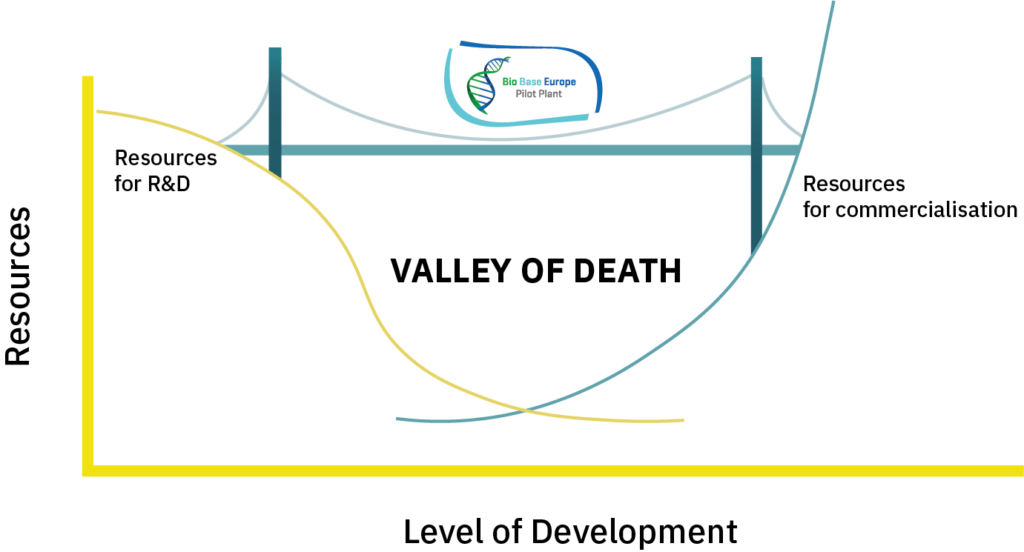Bio Base Europe – visiting the bridge over the innovation ‘valley of death’
We visited the Bio Base Europe pilot facility in Ghent, a scale-up facility for biobased products and processes that aims to smooth the pathway to commercialisation and help bridge over the valley of death.

The valley of death for innovations and startups
The ‘valley of death’ is the name given to the dangerous early period for innovations and even entire startups after seed funding investment has begun to run low in the transition and scale-up towards commercialisation.
Securing cash flow to weather this turbulent period can be tricky, particularly in the sustainable protein space. A major difficulty stems from the cost of generating proof of concept and scalability data. Proving that a process developed in the small fermenters used in R&D will translate to a commercial-scale tank thousands of times larger is tough to do without a lot of expensive equipment, but it is essential to secure the investment needed to safely escape the valley of death.
This kind of resource is not only important for startups but also medium and large companies, who may want to explore the opportunities offered by new products and techniques ahead of making the decision to build their own manufacturing plants.

How Bio Base Europe bridges the valley
At the end of last year, our policy team visited the Bio Base Europe pilot facility in Ghent, a scale-up facility for bio-based products and processes that aims to smooth the pathway to commercialisation and help bridge over the valley of death.
The Bio Base Europe Pilot Plant has used competitive public funding to cover about 50% of its building and facility costs. Operational costs are covered by a mixture of bilateral collaborations with companies and participation in competitive publicly funded projects. Since its founding in 2008, the old fire station in which it started has been transformed into a state-of-the-art pilot facility.
A major local employer, Bio Base Europe Pilot Plant is staffed with highly qualified engineers and technicians who work with many companies, from startups to large businesses, to scale their processes from the lab to an industrial scale. Due to their independence and funding model, Bio Base Europe Pilot Plant staff can offer impartial, confidential consultation on scaling up essential bio-based processes to deliver what the companies working with them need.
The plant currently hosts a diverse range of companies, including several working in fermentation and one in cultivated meat. Environmental sustainability is a common theme among startups involved in the plant, which also hosts projects exploring the upcycling of waste streams from other industries into biochemicals, biomaterials, biofuels and more.
The plant thus far has been a stand-out success, working with more than 200 companies since its founding, and is still expanding to offer more. It has grown rapidly, and now employs over 170 people. This kind of facility, operating as it does on a not-for-profit model, where any profits generated are continuously reinvested to keep its state-of-the-art infrastructure up to date, is rare. Companies from across the globe have come to work there, and its success has inspired the foundation of a similar facility in Thailand.

Case study: ENOUGH
One success story from the plant is ENOUGH, whose innovative mycoprotein products are set to be used in mainstream brands such as Unilever’s The Vegetarian Butcher and major UK retail chain Marks & Spencer. The data gathered as part of their collaboration with the Bio Base Europe Pilot Plant had a direct impact on their achievement of key investments for the scale-up and expansion of the company, totalling almost €60 million. The technical director of ENOUGH did an interview for Bio Base Europe Pilot Plant following the collaboration, explaining how it had been vital for his company’s success:
Takeaways
Most startups and new innovations that enter the valley of death do not emerge on the other side, particularly in the current economic climate, leading to many great projects being stifled before their potential can be realised. The technical requirements for many startups working in fermentation and cultivated meat mean that it is felt particularly acutely in the sector.
Bio Base Europe is a shining example of the important role for pilot facilities in creating an ecosystem that allows researchers and entrepreneurs to take their best shot, providing them with the tools to prove themselves to investors. Following this great success, governments across Europe should be investing in existing pilot facilities to keep them state-of-the-art and to help facilitate access for startups and established companies alike to truly capitalise on the wealth of talent and knowledge in this growing sector.

